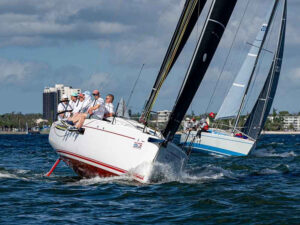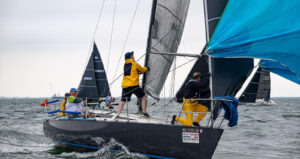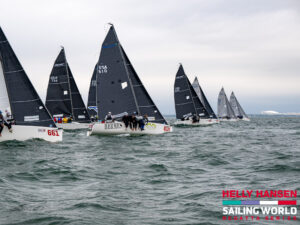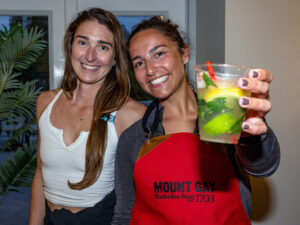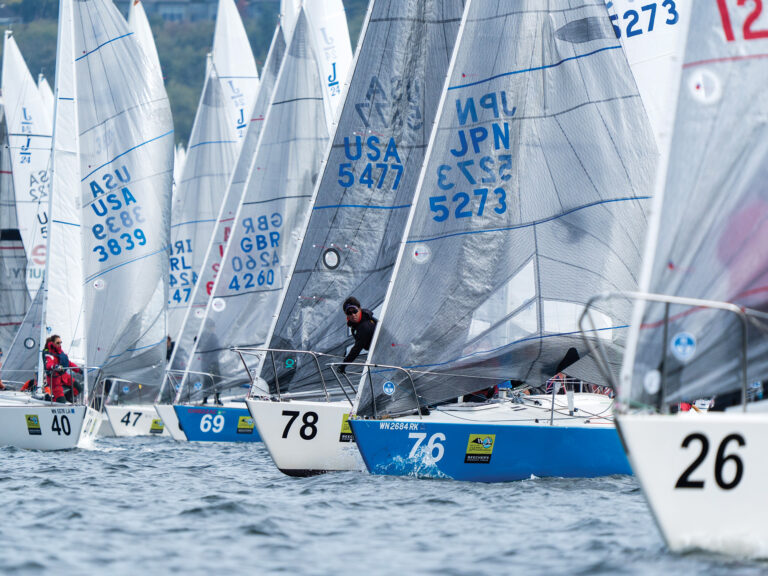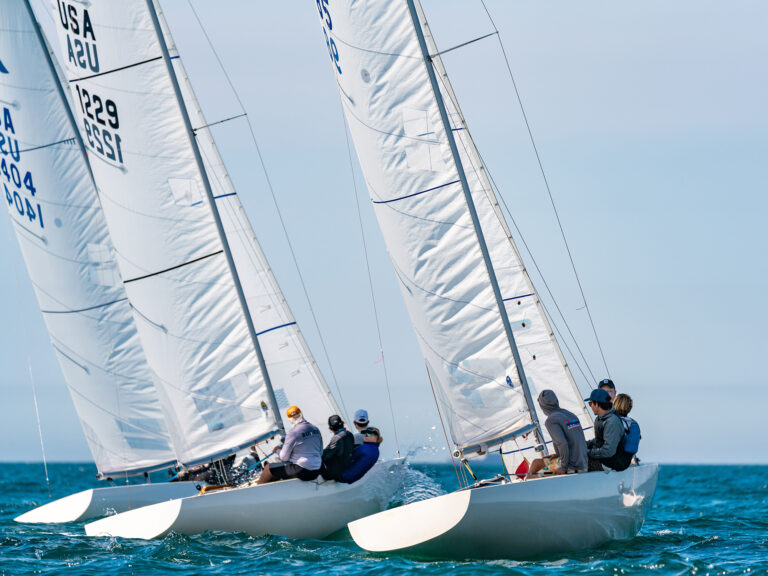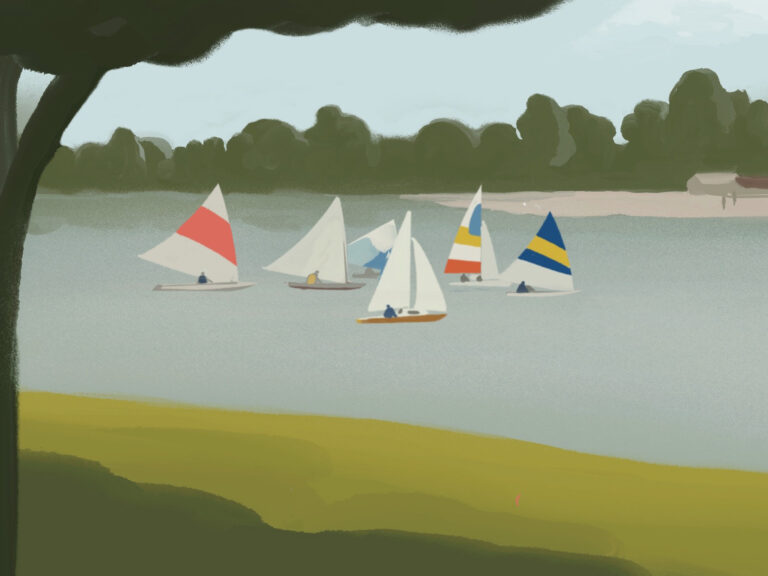The final day of racing at the Lands’ End Annapolis NOOD was another picture-perfect day on the Chesapeake. Eighteen classes, with a total of 279 boats, sailed in six to 12 knots of breeze, and the same ebb tide that bedeviled some, and made others look like heroes the entire three-day series.The largest fleet at the regatta was the 37-boat J/22 class, and from that group came the overall winner of this year’s Lands’ End Annapolis NOOD, Greg Fisher, who’s been sailing in the class for seven years. “The boat’s fun and really tactical, because the tuning is so straightforward,” said Fisher, who sails with his wife, Joanne, daughter Martha, and Jeff Eiber. “The people in the class are a good group, competitive and really intense, but they know how to keep things in perspective.” Fisher is known for holding clinics and drills for J/22 sailors, and says he enjoys those as much as the racing, but even he has his tough days, and today was one of them, despite his familiarity with his home waters off Annapolis. “We certainly didn’t have it figured out today,” said Fisher. “We thought the angle of the current and the breeze out of the river would be beneficial at the leeward end of the line, but it didn’t work out that way. We were lucky to climb back up in the fleet and finish fifth in Race 6. We wouldn’t have been disappointed if the race committee stopped at one race for the day, but they didn’t, and we found that last race quite stressful. It was a tough day, lots of gear changing. At times we’d be hiking hard, and have the backstay on hard, at others, we’d have the crew on the leeward rail. We found it was better to set up for the lulls, and fake it though the heavy stuff; it made a huge difference, especially with all the chop from the motorboats.”In addition to their trophy, Fisher and his crew won a spot at the Lands’ End championship of champions in Tortola, British Virgin Islands, in November, in which the overall winners of all nine NOOD regattas race Sunsail boats against one another to decide which team is the very best.In the 17-boat Melges 24 class, it was down to the wire for the top two boats, Flyer, and Bling Bling. Flyer is owned by Chuck Holzman, but was helmed by Bora Gulari, who’s been sailing a 49er for the US Sailing team for the past six years. Class newcomer Geoff Ewenson, another US Sailing team member from the Finn class, helmed Bling Bling, owned by Geoff Jahn. At the start of the final race, Flyer was four points ahead of Bling Bling, but Ewenson had made it clear that his team wasn’t going to concede victory easily. “Geoff [Ewenson] engaged us in a match race about four minutes before the start, when he came right at us,” said Gulari. “My plan was to set up early so he couldn’t shut us out. We wanted to stay in contact, because Geoff could win if he managed to score a first and put five boats between us. After the start, I should have followed Bling Bling further to the right, but I wasn’t sure how the current was going. Basically, the current in the shallow water turned against us sooner in the shallow water on the left side than it did on the right, and a couple of boats, including Geoff, made huge gains by going right, and got by us.” By the second beat, the top three boats, chillout, Bling Bling, and Flyer, were way ahead of the rest of the class, and Ewenson still had his sights on Flyer. “Bling Bling rounded the final leeward mark first and came at us again, but they had problems with their jib and their kite and almost hit the mark,” said Gulari. “They were still ahead, and we duked it out the entire beat. They were right there in front of us, match racing again, and we had a little discussion. I asked him if we could just finish the regatta, and he agreed.” Bling Bling and Flyer were in lock step as they crossed the line, with Ewenson in second behind Jim Golden’s chillout, and Flyer in third. “They [Bling Bling] sailed a tough regatta,” said Gulari. “They were really tough to beat.” Gulari gave his team, bowman Mike Firestrong, middle man Ed Wheatley, and trimmer Patrick Drummond lots of credit for their win. “I try to take Mike and Patrick with me to every regatta, and I’m trying to get Ed to do that, too,” he said. “They’re not well-known names in the sport, but they’re really good sailors.”Since 1965, the Alberg 30 class has been racing on the Chesapeake, and Rolph Townshend’s Skybird has been involved since the beginning. It’s the oldest cruising one-design class on the Bay, and Townshend, at 77 year of age, may well have been the oldest competitor in the regatta. He was certainly the oldest class winner, as he cheerfully admits. “We’ve won this event six or seven times,” said Townshend. “Now we’re getting old and all these young guys are coming up and banging on us, and it’s getting more difficult to win. One of my young friends, Tim Williams, almost beat us this time. All my crew is on Medicare, but we take our pills and our painkillers and go sailing.” Townshend said the Alberg 30 began as a cruising class in 1965, and 235 boats are in the class association and located all over the United States. “This class is responsible for many marriages, and many babies,” said Townshend. Despite coming in last in the final race, Townshend and his crew won the seven-boat class, beating a tiebreaker with LinGin, skippered by Tim Williams. In third, with 12 points, was C. B. Curriers’ Infinity.Another class winner who cruised before taking up racing was Catalina 27 owner John Ebell, on his boat Hi Tide. Ebell who’s owned his boat for 20 years, has won the Annapolis NOOD four times. “I cruised all over,” said Ebell, “from New York City to Norfolk for ten years. I needed to do something new, so I took up racing.” One of Ebell’s best friends is also his top competition, Tom Walsh, who owns Four Little Ducks, and finished second overall. “We prod and push each other on the race course, and sail on other people’s boats and help them out.” Ebell agreed that the current was a major factor this year. “For us, the answer was to go left, and come in on a short port layline,” he said. “It worked great from the first race on, which we were leading by three-quarters of a leg when the race was abandoned because the weather mark drifted away.” Ebell’s technique for winning sounds deceptively simple. “We sail as fast as we can, and keep the boatspeed up,” he said. “Our boats are old and slow, but we’re racing one-design, so it’s OK. Old boats need more tweaking than fast sleds, and my crew is great at changing gears and keeping the boat moving.”For complete results, see www.sailingworld.com
